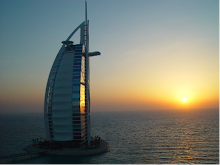It was a very pleasant day -- sunny but not unduly warm (it was mid-winter in USA). Among the highlights of the day:
- Driving around the bustling construction sites... one after another after another. I have not seen such concentration of construction sites in one place, ever.
- Mid-morning stroll through a semi-open-air mall, enjoying a cup of cappuccino with a view of the ponds and canals that give a Venice-like feel and a view of the towering Burj Dubai hotel.
- Later, a visit to the huge Mall of the Emirates and the stunning indoor ski area. It was mind-boggling to see ski lifts, skiers, and little kids learning to ski and skate at the bottom of the hill, all inside a building that looks like a huge, tilted aircraft hangar from the outside.
- There is an entire road devoted to educational buildings. One after another are branch campuses of leading educational institutions from Europe, India, and so on.
- Lunch at the Dubai Golf Club, where Tiger Woods has launched an annual golf tournament.
- A drive through the enormous Jebel Ali port and free trade zone, with miles and miles of warehouses and assembly plants and petroleum tanks, and of course deep-water berths and cranes for loading and unloading of vessels.
- Drive to the outlying sand dunes, where -- as the sunset approaches -- All-Terrain Vehicles (ATVs) romp through the sands while SUVs loaded with tourists offer dare-devil steep dune rides.
The place is so unreal, yet so palpably real, that it leaves you dizzy. All the building activity is on a rush schedule, as if to get the post-petroleum economy in place way, way before petroleum resources run out. Which they might soon, at least in the case of Dubai, for among the UAE emirates, Dubai is not that oil rich.
If China as a country seems to be on an economic development rush, the city-state of Dubai is in a red-hot, jet-speed super rush.
Nik Dholakia
Professor
University of Rhode Island


